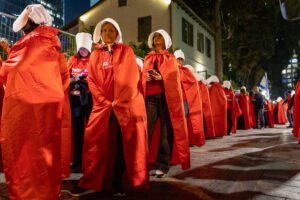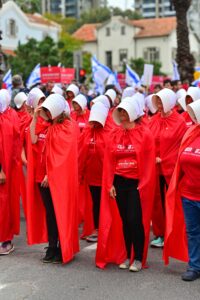‘We Looked Like an Army’: Meet The Handmaids Standing Up to Netanyahu
¨
¨

J Street’s “Our Israel” project spotlights the amazing Israelis who are committed to advancing democracy, justice, equality and peace – shared values enshrined in Israel’s Declaration of Independence.

Marching through Jerusalem, Lee Hoffmann Agiv struggled to see. Her white bonnet tunneled around the frame of her face and blocked her periphery.
Still, she could hear.
“Look, look!” voices from the crowd said. Around her, huddles formed and stared in awe. But the 36-year-old Israeli mother says she didn’t have to see to safely march from the Supreme Court to the Knesset.
“It felt like the parting of the Red Sea,” she told J Street in an interview.
Crowds stepped aside for Hoffmann Agiv and the 20 other women debuting handmaid costumes at a February pro-democracy demonstration in Jerusalem.
The stark, instantly recognizable red and white costumes are a reference to the uniforms forced upon enslaved women in Margaret Atwood’s patriarchal dystopia The Handmaid’s Tale.
Today, the procession of women dressed in all red has become a staple at weekly protests against Prime Minister Benjamin Netanyahu’s judicial overhaul, underscoring the threat to democratic freedoms and gender equality.
The handmaids are directed by Bonot Alternativa, Building an Alternative. Just months since she first joined the protests, Hoffmann Agiv has traded in the red cloak for a red shirt and megaphone. Rather than join the handmaids, she leads them.
“I’m not alone. There are many more like me,” she tells J Street. “It’s not scary anymore because I know that someone has my back.”

Hoffmann Agiv had little experience in political organizing before the beginning of 2023. The mother of two young daughters, she joined Bonot Alternativa shortly after Netanyahu’s coalition took office and now serves as general field operations manager. Hoffmann Agiv says she was drawn to Bonot Alternativa’s mission to help protect and defend women’s rights against the most extreme, most right-wing government in Israel’s history.
Since Israeli Moran Zer Katzenstein founded Bonot Alternativa in 2020, the organization has grown exponentially. Now, the collective is a fixture at the historic weekly pro-democracy demonstrations across Israel.
Hoffmann Agiv couldn’t have guessed what was in store when a fellow demonstrator pitched the handmaid garb to the group. Despite initial apprehension over the costume’s potential to draw eager eyes to the movement, Zer Katzenstein gave the green light.
“That’s how we do it in Bonot Alternativa,” Hoffmann Agiv said. “If you have an idea, go. And so we went.”
The bold costumes drew together two societies – one fictitious and one real – plagued by fundamentalist leaders keen on undermining the role of women.
The group bought out a party store of all its red capes. The store’s supply, stocked for Purim, wasn’t enough to meet the demand of all the women who wanted to join. Still, the handmaids, who have only grown in number since their inaugural march in Jerusalem, made an impression.
Just minutes after she began marching, Hoffmann Agiv’s phone buzzed. Her family saw her and the other cloaked women on the news. Word spread quickly.
“We started receiving messages and phone calls from women all over Israel, saying, ‘Can you teach me how to make the hats? Where do I get the cloaks? How can I do this too?’I immediately understood that we have an opportunity to create not just a lot of handmaids but a network.”
Today, 100,000 women march with Bonot Alternativa across 80 Israeli cities. Hoffmann Agiv helps coordinate the roughly 150 leaders from Eilat in the south to Acre in the north who want to bring the handmaids and other actions to their communities.
The costumes have proved to be a powerful recruiting tool for advocacy. “Most women marching with Bonot Alternativa had nothing to do with activism before. We created a movement of women fighting for women’s rights everywhere in Israel,” she says.
Hoffmann Agiv says that the organization has allowed women to be unapologetically feminist.
“Women don’t feel alone,” she says. “We looked like an army in one of our Tel Aviv marches. When someone sees videos of hundreds of women walking, organized, like an army all in red, they see themselves as a part of us.”
In under a year, Bonot Alternativa has expanded its operations beyond pro-democracy demonstrations.
Just last month, an Israeli bus driver demanded a group of teenage girls sit in the back of the bus and cover up to accommodate ultra-Orthodox passengers. Unfortunately for him, one of the young girls was the daughter of a Bonot Alternativa organizer. She called her mother, and Bonot Alternativa responded immediately.
“We were able to get her on the radio in the biggest station in Israel while she was on the bus,” Hoffmann Agiv says. “We also got people to wait for her at the station when she arrived.”
The moment led to a new initiative by the women’s rights group to collect phone calls of women facing public, gender-based discrimination. Bonot Alternativa has amassed a group of Israeli men and women at the ready to field calls.

“We were in a nightmare during those hours, but afterward, it felt like every mistake they made was a gift. We use it. We use it because we’re not going to be quiet anymore. The status quo has been broken,” Hoffmann Agiv says.
Hoffmann Agiv says that before Netanyahu’s government came to power, she and other secular Israelis saw their lives as entirely separate from the ultra-Orthodox. However, as the incident on the bus proved, the values and norms of the ultra-Orthodox community are increasingly being imposed on Israelis at large.
Currently, far-right members of Netanyahu’s coalition are pushing legislation to give vast new powers to rabbinic courts and enforce gender-based segregation in the public sphere. Bonot Alternativa and the pro-democracy movement fiercely oppose these moves.
It’s not just opposition, the group aims to build bridges as well. Bonot Alternativa has initiated meetups between religious and secular women. Hoffmann Agiv says that after getting to know each other the groups discuss women’s rights and how they can support each other.
“We came to the conclusion that first, we need to know each other better. We never meet at any point in our lives. We don’t go to school together. We don’t work together. I would have never met them,” she says.
The collective is also responding to Israeli politics on the local level. Bonot Alternativa is dedicated to adding 50 women to local councils and encouraging its members to run for those spots.
“We encourage more women to run for office, we encourage women to vote and we encourage women to ask questions,” she says. “When women are at the table where decisions are made, there are better decisions for everyone.”

Prime Minister Netanyahu has slammed pro-democracy protesters, including Bonot Alternativa, for allegedly undermining their country. Before taking off to the US last week to attend the UN General Assembly, Netanyahu accused protesters of aligning with the Iranian regime.
“Netanyahu is the only one that’s getting us anywhere near Iran with his behavior,” Hoffmann Agiv says. “He wants to send women hundreds of years back. Remember, it wasn’t that far ago that women were not allowed to vote.”
“Netanyahu is talking about people that are devoted and dedicating their lives to this country to keep it a democracy. If we don’t fight, people will flee, will run away,” she says.
At home and abroad, Hoffmann Agiv says standing up for Israel must look like supporting the Israeli pro-democracy movement and standing against the judicial overhaul, which violates its founding commitment to democracy.
“We feel a big hole underneath our feet. We need someone to reach out and not let us fall,” Hoffmann Agiv says.
The women’s rights organizer wants American Jews to engage with their Members of Congress and push them to support democracy in Israel. Under Netanyahu, the stakes are high. She says the Jewish homeland, as American Jews once knew it, will cease to exist should Netanyahu carry out his sweeping overhaul.
“If you want Israel to be your second home, if you want to come here and enjoy this glorious country, you will need to support us,” Hoffmann Agiv says. “Netanyahu is leaving a burned land.”
“We won’t go where Netanyahu is pushing us. When someone is threatening women’s rights in Israel, we will fight until the last breath.”